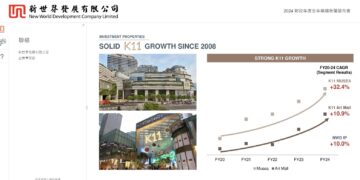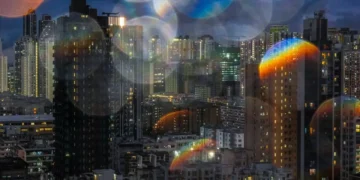She transformed the maps into large pieces of garment donned by herself and her partner, dancer Francisco Borges, as part of a performance art piece at Art Basel Hong Kong.
The inspiration for the performance – which sees the pair cocooned in the weaved-together maps – came from Chen’s time living near the Portuguese seaside, when she experienced pandemic-induced solitude.
“[The act of weaving together] the maps is like inviting people and my friends during the lockdown period. So like in 2020, people can’t send me the maps during that time. Everything was closed,” she said.
Chen said their performance, titled “Questioning the Line”, also explores the entanglement between human and nature and the roles of borders and nationality.
“For us it has different layers of lines, different lines to question. For example, one of the lines is this, between human and nature. Where is that line really?” Chen’s partner, Borges told RTHK.
“We are born from the land, we eat the food from the land, we drink the water from the land. And when we poison the land, and we poison the water, we poison ourselves. So where is really that barrier, that clear line?” he said.
To show human unity and interdependence, Chen also collects expired passports and gives them new life by knitting them together in a separate project called “Beyond the Surface”.
She is not the only artist exploring humanity and nature at this year’s Art Basel.
American painter and writer Alec Egan lost his home and studio to the Los Angeles fire in January. Despite the devastation, he created five new paintings to depict LA coastal scenes in a temporary studio provided by Anat Egbi Gallery, which is showcasing his works at Art Basel.
Egan’s new works – which reflects both disaster and nature – pays homage to his lost work and captures the eerie beauty of ash-filled skies.
“In the face of something really traumatic, he continues to focus on beauty and there is quiet solitude. So I hope that [audiences will take away] hopefulness,” said the gallery’s sales director Amanda McMorran.
Adding another compelling voice to the fair is first-time exhibitor Shin Min from Seoul’s P21 studio.
Drawing from her experience working in the service industry, her “Ew! There is hair in the food!!” exhibition highlights misogyny in Korea, and challenges the notion of never saying no to customers.
“I talk about workers’ hair because we are not robots. We are human and we are not machines. We have hair. We have spit,” Shin said in explaining the central message of her work.
Art Basel, the SAR’s largest international art fair, brings together more than 240 galleries from around the world this year.
She transformed the maps into large pieces of garment donned by herself and her partner, dancer Francisco Borges, as part of a performance art piece at Art Basel Hong Kong.
The inspiration for the performance – which sees the pair cocooned in the weaved-together maps – came from Chen’s time living near the Portuguese seaside, when she experienced pandemic-induced solitude.
“[The act of weaving together] the maps is like inviting people and my friends during the lockdown period. So like in 2020, people can’t send me the maps during that time. Everything was closed,” she said.
Chen said their performance, titled “Questioning the Line”, also explores the entanglement between human and nature and the roles of borders and nationality.
“For us it has different layers of lines, different lines to question. For example, one of the lines is this, between human and nature. Where is that line really?” Chen’s partner, Borges told RTHK.
“We are born from the land, we eat the food from the land, we drink the water from the land. And when we poison the land, and we poison the water, we poison ourselves. So where is really that barrier, that clear line?” he said.
To show human unity and interdependence, Chen also collects expired passports and gives them new life by knitting them together in a separate project called “Beyond the Surface”.
She is not the only artist exploring humanity and nature at this year’s Art Basel.
American painter and writer Alec Egan lost his home and studio to the Los Angeles fire in January. Despite the devastation, he created five new paintings to depict LA coastal scenes in a temporary studio provided by Anat Egbi Gallery, which is showcasing his works at Art Basel.
Egan’s new works – which reflects both disaster and nature – pays homage to his lost work and captures the eerie beauty of ash-filled skies.
“In the face of something really traumatic, he continues to focus on beauty and there is quiet solitude. So I hope that [audiences will take away] hopefulness,” said the gallery’s sales director Amanda McMorran.
Adding another compelling voice to the fair is first-time exhibitor Shin Min from Seoul’s P21 studio.
Drawing from her experience working in the service industry, her “Ew! There is hair in the food!!” exhibition highlights misogyny in Korea, and challenges the notion of never saying no to customers.
“I talk about workers’ hair because we are not robots. We are human and we are not machines. We have hair. We have spit,” Shin said in explaining the central message of her work.
Art Basel, the SAR’s largest international art fair, brings together more than 240 galleries from around the world this year.































